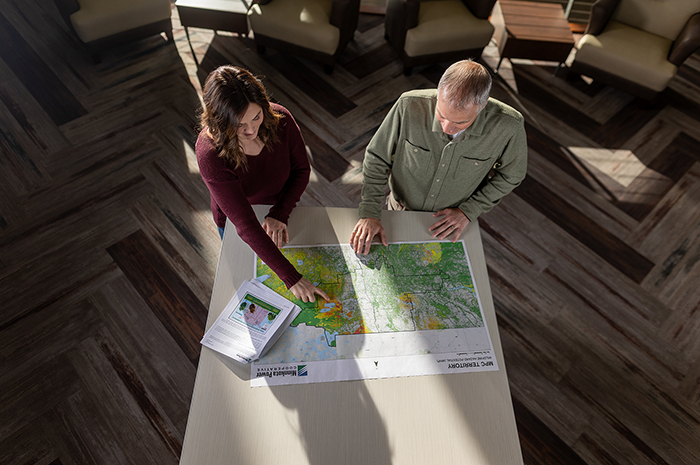Food for the community, food for the soul
The Rural Access Distribution (RAD) Cooperative is combatting North Dakota grocery store closures with some small-town collaboration.
Jenna Gullickson is the town grocer for Hoople, N.D., a community of (almost) 300 people bobbing on the north edge of Walsh County. She doesn’t have many mouths to feed, but every stomach matters to her. These are her neighbors.
She cares so much that when the grocery store’s former owners retired in 2015, she and her husband stepped in and bought what is now Hoople Grocery. At that time, small-town grocery stores across the state were closing down as the price of rural supply and distribution rose. Gullickson wasn’t going to let that happen to Hoople.
She’d only been at the helm for a couple of years when Diana Hahn and Lori Capouch showed up at the store. Hahn, the owner of Jim’s SuperValu in Park River, N.D., and Capouch, Rural Development Director for the North Dakota Association of Rural Electric Cooperatives (NDAREC), pitched a proposal for a collaborative system of purchasing and delivering groceries to multiple small towns in Walsh County. It would eventually come to be known as the Rural Access Distribution (RAD) Cooperative, and they wanted Gullickson on board.
“I was like, yep, any help I can get!” she recalled. “I was willing to work, save money, get more product in my store – anything I could do to help out our community, I was totally willing to work with them and do it.”

Supporters of the cooperative idea came from all corners of Walsh County – Fordville, Adams, Edinburg, Park River and Hoople. All partners knew a collaborative model would help the stores (and communities lacking stores) not only survive, but thrive. The key elements were forming a purchasing cooperative to bring their collective volume up and distributing it on one truck, aggregating from many suppliers so grocers didn’t have as many separate delivery fees.
“I’ve had people approach me and ask, ‘Why did you do this? Why would you help your competitors out?’ Well, I don’t always think of everyone as competitors,” Hahn said. “To me, it goes back to community.”
Core of the problem
The notion of the RAD Cooperative was simple on the surface. But a lot of groundwork had already been laid in the few years before Gullickson was approached. In 2014, Capouch received a call from a rural grocery store inquiring about grants available to cover operating losses. There weren’t any such grants.
“We’d never had a call from a grocery store before, and then we got about 10 calls that year. So we thought, OK, there’s a problem here,” Capouch said. She and her NDAREC team did some quick research and found other states were looking into why their grocery stores were declining.
“After losing food access, what else do you have left? We had already lost so much in our rural main streets, if we lost our grocery stores, too…,” she said with sigh of disbelief. “It seemed like the last little thing that could pull out that could tip a community past that sustainability point.”
Northern Municipal Power Agency (NMPA) general manager Jasper Schneider served as North Dakota state director for the U.S. Department of Agriculture’s (USDA) Rural Development division from 2009-2015. At that time, he saw the evolution beginning in the small towns for which he would eventually help deliver electricity. NMPA is the power provider for 12 municipal utilities in the region, including Park River.
“The predominant demographic in those rural areas is senior citizens, who may not have the wherewithal or means to travel 50 miles to a larger town like Grand Forks,” Schneider said. “The rural grocery stores are literally the lifeline in providing fresh food that is so critical to preserving that community.”

In 2016, the average U.S. grocery store had a weekly sales volume of $320,000. North Dakota’s midpoint was $20,000. Capouch learned that some store owners were driving to big box stores to buy their supplies to save on costs. A retail wholesale price, in some cases, was cheaper than a wholesale supply from their supplier.
Capouch surveyed stores around the state to see where the challenges were. She assembled a task force of owners and small-town community leaders and found an area of the state where there were already the beginnings of collaboration.
“Cooperatives have been the model to help people in rural places solve for issues that the private sector can’t solve for, because there’s no money to be made. We were looking to use cooperatives to make food access stronger in rural places. That’s how we ended up in Walsh County,” Capouch said. “They had a grocer who said she had backroom space for aggregating product and sorting it. And we had three grocers [Hahn, Gullickson, and Edinbug’s Cindy Vargason] that were already independent and competitive, but they were already working together to make sure that everybody had the supplies that they needed.”
Walsh County is also home to Fordville, a community of just over 200 people that had recently lost its store, as well as Adams, a town that was facing obstacles. “They already understood that if they didn’t work together for food access, they were going to lose it,” Capouch said.
As the partners came together, they uncovered all the ways they could get fresh, affordable food to remote communities. With pilot funding through several organizations including the Bush Foundation; the USDA; Blue Cross, Blue Shield; and a generous anonymous donor, RAD Cooperative was able to secure a large delivery truck and two climate-controlled grocery locker systems which can hold co-op deliveries (ordered online) to remote areas. One locker system is placed in Wells Drinking Well in Fordville, while the other stands near the entrance of Park River’s SuperValu.
The cooperative is working through the technical logistics of the food lockers and online ordering system, but they hope to be running at full speed soon. When active, customers will enter their grocery order online, drive to the nearest locker when prompted, enter a special locker PIN, and access their healthy food – without driving an hour to get it.

“Our hope would be that we could expand out and we could help other areas. I think there’s a limit to how far out we can drive to make it viable. It doesn’t have to be profitable,” Hahn said. “Our plan is not to operate to make money. It’s to operate to cover costs.”
Community cooperation
RAD Cooperative has fortified its effect on Walsh County by rolling in new members and opportunities. The co-op is now distributing food and milk to the Valley-Edinburg School District (which lost its suppliers during the pandemic). They also hope to soon add Park River’s bakery as a member, which would supply bread for the schools. A local potato producer is moving his potatoes through the co-op, and additional entities like daycares and restaurants are exploring how they can get involved.
Other businesses who don’t need deliveries but want to see the co-op succeed are also doing their part by sponsoring advertising on the RAD distribution truck. The local truck company itself is supporting the effort with a special contract for the co-op.

“It is amazing how many people have contributed. It’s been a hard project, but it’s been an easy project at the same time because so many people care about food access and they want to participate,” Capouch said. “This project just makes your heart melt.”
“Whether it’s grocery stores or electricity or broadband, it’s so easy to give up and say we’re going to move to an area with a higher population density or we’ll let the free market solve this,” Schneider said. “But rural people really grab life by the horns and come up with these creative solutions. That’s where co-ops shine.”
Gullickson doesn’t consider herself any kind of pioneer. She’s just a mother raising two sons in a region she loves, and a business owner with a chance to deliver new energy to her community.
“Especially in Hoople, there are quite a few young people right now,” she said. “I have young kids, too, so I get out and talk to the moms and ask them what they want and what they want to see in the store. It’s good – we need to keep them there.”
MAIN IMAGE: Diana Hahn (left), owner of Jim's SuperValu in Park River, and Jenna Gullickson (right), owner of Hoople Grocery, are both board members of the Rural Access Distribution Cooperative. (Minnkota/Michael Hoeft)
...



